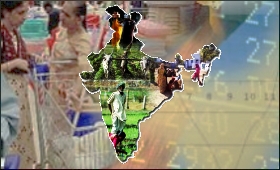|
|
|

|
Rural economy fared better in lockdown 2.0: Survey
|
|

|
|
| Top Stories |
 |
|
|
|
SME Times News Bureau | 29 Jun, 2021
Smart Power India (SPI), a subsidiary of the Rockefeller Foundation, has
released the results of their survey titled "SPI's Survey of Mini-grid
Villages May 2021" which shows that overall economic activity in such
villages was less affected in 2021 due to the pandemic that largely
impacted the healthcare and educational sector.
The survey was
carried out to assess the impact of COVID-19, with a sample size of 200
respondents across 48 villages in the states of Uttar Pradesh and Bihar.
It was learnt that while overall economic activity in mini-grid
villages was less affected in 2021, the impact on education and
healthcare infrastructure was much worse compared to 2020. SPI conducts
these surveys periodically to stay abreast of evolving issues the rural
Indian consumer is dealing with, in the light of the pandemic.
According
to recent SPI surveys conducted in mini-grid villages, 61% of the
participants responded that availability of essential services this year
was better than the lockdown in 2020. Family income also showed
improvement as compared to the first lockdown as 29% of the respondents
expressed that 10 to 25% of their family income this year was impacted
due to the lockdown due to better preparedness. Around 1.6% of the
respondents faced no impact of the lockdown on their incomes.
This
improvement in the family incomes in rural areas can be attributed to
reliable access to electricity that has been consistent towards the
rural communities amidst both the lockdowns in 2020 and 2021. 67% of the
respondents of the survey expressed satisfaction with the quality and
availability of reliable electricity from mini-grids.
Though
India's economy reflected the signs of recovery after the first wave
peaked in September 2020, this recovery wasn't consistent. Income,
employment and health were still key concerns for rural communities. A
recent report by CSE estimates that more than 230 million Indians fell
below the national minimum wage due to the COVID-19 crisis. The loss of
jobs, decrease in wages, and unavailability of the health infrastructure
remains a concern, leaving the rural masses unable to properly feed
their families.
Many of those who had lost their jobs during the
2020 lockdown had found employment again but there was a fall in
aggregate income - 90% due to lower earnings and the rest due to job
loss. As the second wave swept India, the nation reported 1,432,292 new
COVID-19 cases and 24,914 deaths (as of June 20, 2021).
India is
at the cusp of another deadly wave of the pandemic. With new variants
of the virus entering our ecosystem, the upcoming wave is expected to be
as deadly as the last. Pre-empting this situation, SPI is working to
understand the ground realities and requirements for rural communities
by building a resource bank, adapting from survey insights to understand
the pain points and offering quick, locally relevant solutions.
Commenting
on the third edition of the survey, Jaideep Mukherji, CEO, Smart Power
India, said, "Through our consumer survey in 2021, we observed that
education and health were severely impacted in rural communities due to
the lockdown. The current survey revealed nearly 34% of rural students
were coerced to discontinue online education due to lack of
infrastructure. As the virus enters rural areas, it is bound to have an
economic impact and this distress can't be captured immediately by
aggregate GDP numbers; it will only show after a while. The focus now is
on reviving the economy and ensuring that rural communities receive
maximum possible help through organizations, government and
individuals."
"Based on our survey findings last year, we
launched the Consumer Voucher scheme whereas this year, understanding
the health emergency that rural communities are going through, we have
partnered with three NGOs that are working on ground to provide medical
assistance to the rural masses."
|
|
|
| |
|
|
|
|
|
|
|
|
|
|
|
|
|
|
| |
| Customs Exchange Rates |
| Currency |
Import |
Export |
US Dollar
|
66.20
|
64.50 |
UK Pound
|
87.50
|
84.65 |
Euro
|
78.25
|
75.65 |
| Japanese
Yen |
58.85 |
56.85 |
| As on 13 Aug, 2022 |
|
|
| Daily Poll |
 |
 |
| PM Modi's recent US visit to redefine India-US bilateral relations |
|
|
|
|
|
| Commented Stories |
 |
|
|
|
|
|
| |
|